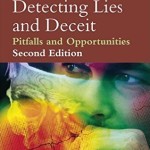 Dutch psychologist Aldert Vrij can tell if you’re lying.
Dutch psychologist Aldert Vrij can tell if you’re lying.
Vrij has published more than 500 articles on using verbal and non-verbal cues for lie detection. His book Detecting Lies and Deceit: Pitfalls and Opportunities has been called “the most comprehensive review of deception to date.” At more than 500 pages, it’s not only comprehensive, it’s long. And I don’t want to lie: I never found the time to read it.
Luckily, I found many articles which summarized the book, including this one from Scientific America. Vrij’s research suggests there are 18 traits which make up a good liar:
1. Manipulativeness
Manipulators frequently tell lies, tend to persist in lying when challenged to tell the truth, and don't feel uncomfortable
or guilty when lying
2. Acting
Good actors make good liars; receptive audiences encourage confidence
3. Expressiveness
Animated people create favorable first impressions, making liars seductive and their expressions distracting.
4. Physical attractiveness
Pretty people are judged as being more honest than unattractive people.
5. Natural performers
These people can adapt to abrupt changes in the discourse with a convincing spontaneity.
6. Experience
Prior lying helps people manage familiar emotions, such as guilt and fear, which can “leak” behaviorally and tip off
observers.
7. Confidence
You’ve got to believe in your ability to deceive others.
8. Emotional camouflage
Liars "mask their stark inclination to show the emotional expressions they truly feel" by feigning the opposite effect.
9. Eloquence
Eloquent speakers confound listeners with word play and buy extra time to ponder a plausible answer by giving
long-winded responses.
10. Well-preparedness
This minimizes fabrication on the spot, which is vulnerable to detection.
11. Unverifiable responding.
Concealing information ("I honestly don’t remember") is preferable to a constructed lie because it cannot be
disconfirmed.
12. Information frugality
Saying as little as possible in response to pointed questions makes it all the more difficult to confirm or disconfirm
details.
13. Original thinking
Even meticulous liars can be thrown by the unexpected, so the ability to give original, convincing, non-scripted
responses comes in handy.
14. Rapid thinking
Delays and verbal fillers signal deception, so good liars are quick-witted, thinking fast on their feet.
15. Intelligence
Intelligence enables an efficient shouldering of the “cognitive load” imposed by lying, since there are many complex,
simultaneously occurring demands associated with monitoring one’s own deceptiveness.
16. Good memory
Interrogators’ ears will prick at inconsistencies. A good memory allows a liar to remember details without tripping
in their own fibs.
17. Truth adherence
Lies that "bend the truth" are generally more convincing, and require less cognitive effort, than those that involve
fabricating an entire story.
18. Decoding
The ability to detect suspicion in the listener allows the liar to make the necessary adjustments, borrowing from
strategies in the preceding skill set.
In short, lying requires an extensive range of skills. So lying isn’t just culturally wrong, it’s hard work. Which gives all of us yet-another reason to tell the truth; it’s easier. As Mark Twain allegedly said:
If you tell the truth, you don't have to remember anything.
This blog was originally posted on Manage by Walking Around on July 3, 2016.